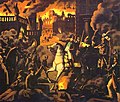Wikipedia:Selected anniversaries/September 14
This is a list of selected September 14 anniversaries that appear in the "On this day" section of the Main Page. To suggest a new item, in most cases, you can be bold and edit this page. Please read the selected anniversaries guidelines before making your edit. However, if your addition might be controversial or on a day that is or will soon be on the Main Page, please post your suggestion on the talk page instead.
Please note that the events listed on the Main Page are chosen based more on relative article quality and to maintain a mix of topics, not based solely on how important or significant their subjects are. Only four to five events are posted at a time and thus not everything that is "most important and significant" can be listed. In addition, an event is generally not posted this year if it is also the subject of the scheduled featured article or picture of the day.
To report an error when this appears on the Main Page, see Main Page errors. Please remember that this list defers to the supporting articles, so it is best to achieve consensus and make any necessary changes there first.
Images
Use only ONE image at a time
-
Isadora Duncan
-
St Basil's cathedral, Moscow
-
Theodore Roosevelt
-
Luna 2
-
Fire of Moscow
Ineligible
| Blurb | Reason |
|---|---|
| 1607 – Flight of the Earls: Hugh O'Neill, 2nd Earl of Tyrone, Rory O'Donnell, 1st Earl of Tyrconnell, and their families and followers departed Ireland for Spain. | Tagged with {{refimprove}} |
| 1812 – French invasion of Russia: Following the Battle of Borodino seven days earlier, Napoleon and his Grande Armée captured Moscow, only to find the city deserted and burning. | needs more footnotes |
| 1927 – In a freak automobile accident, dancer Isadora Duncan was strangled to death in Nice, France, by her scarf after it got caught on the wheel of a car in which she was a passenger. | lots of {{cn}} tags |
| 1946 – Residents of the Faroe Islands narrowly approved a referendum on independence from Denmark. | refimprove section |
| 1954 – In a top secret nuclear test, a Soviet Tu-4 bomber dropped a 40-kiloton atomic weapon just north of Totskoye village, exposing some 45,000 soldiers and 10,000 civilians to nuclear fallout. | refimprove section |
| 1959 – The Soviet spacecraft Luna 2 crashed onto and became the first man-made object to reach the Moon. | unreferenced section |
| 1960 – At a conference held in Baghdad, the governments of Iran, Iraq, Kuwait, Saudi Arabia, and Venezuela founded OPEC to help unify and coordinate their petroleum policies. | refimprove section |
| 1992 – The Constitutional Court of Bosnia and Herzegovina declared the breakaway Croatian Republic of Herzeg-Bosnia to be illegal. | unreferenced section |
Eligible
- 786 – Harun al-Rashid became the Abbasid caliph upon the death of his brother al-Hadi.
- 1763 – About 300 Seneca warriors during Pontiac's Rebellion attacked a British Army detachment, killing 81 soldiers.
- 1926 – The Locarno Treaties establishing post-First World War territorial settlements were formally ratified by the signatory nations and came into effect.
- 1975 – Elizabeth Ann Seton became the first native-born citizen of the United States to be canonized.
- 1979 – Afghan President Nur Muhammad Taraki was assassinated upon the order of Hafizullah Amin, who became the new president.
- 1982 – President-elect of Lebanon Bachir Gemayel was assassinated when a bomb exploded in the Beirut headquarters of the Phalange.
- 2007 – Late-2000s financial crisis: The Northern Rock bank received a liquidity support facility from the Bank of England, sparking a bank run—the United Kingdom's first in 150 years.
- 2008 – All 88 people aboard Aeroflot Flight 821 died when the aircraft crashed on approach to Perm International Airport in Perm Krai, Russia.
Notes
- Big Stick ideology appears on September 2 and Assassination of William McKinley appears on September 6, so Roosevelt should not appear in the same year.
September 14: Feast of the Cross (Christianity)
- 81 – Domitian, the last Flavian emperor of Rome, was confirmed by the Senate to succeed his brother Titus.
- 1752 – In adopting the Gregorian calendar under the terms of the Calendar (New Style) Act 1750, the British Empire skipped eleven days: (September 2 was followed directly by September 14).
- 1901 – Theodore Roosevelt became President of the United States at age 42, the youngest person ever to do so, eight days after William McKinley was fatally wounded in Buffalo, New York.
- 1911 – Prime Minister of Russia Pyotr Stolypin (pictured) was mortally shot at the Kiev Opera House.
- 2003 – Kumba Ialá, the President of Guinea-Bissau, was deposed in a bloodless coup.





